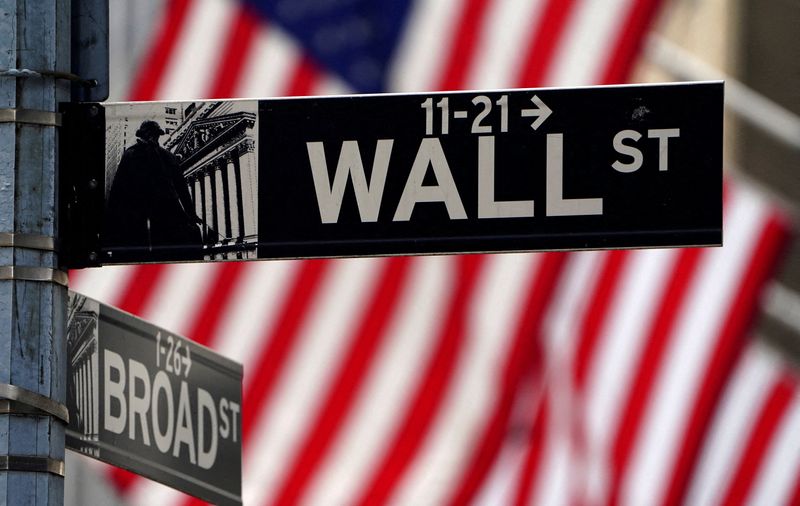By Amanda Cooper and Naomi Rovnick
LONDON (Reuters) -Investors are ditching some of this year's favourite trades as a retreat in the glitzy megacaps risks snowballing into a multi-pronged selloff that has hit everything from cryptocurrency to gold, and made calling the market's next move ever more complex.
Shares on Wall Street ended lower on Thursday, adding to losses after the S&P 500 and Nasdaq on Wednesday suffered their worst day since late 2022.
The 2024 "everything rally" - stocks, and especially tech, up; gold and crypto - up; dollar - up; emerging markets, up - may be on hold.
A diverse set of factors has lit the fuse of market anxiety over how stretched valuations in Big Tech might be, against a backdrop of rising U.S.-China trade tensions and tepid earnings.
Quarterly results from Tesla (NASDAQ:TSLA) and Alphabet (NASDAQ:GOOGL), the first of Wall Street's most valuable companies to report, have unnerved investors ahead of a deluge of results next week.
Microsoft (NASDAQ:MSFT) reports on Tuesday, followed by Meta (NASDAQ:META) Platforms on Wednesday, and then Amazon (NASDAQ:AMZN) and Apple (NASDAQ:AAPL) on Thursday. Those four companies have a combined stock market value of over $9 trillion and account for a fifth of the entire S&P 500.
“Investor positioning was pretty pro-risk and people had become quite positively inclined towards markets and valuations had become quite stretched,” said Toby Gibb, head of investment solutions at fund manager Artemis in London.“It's difficult to call whether the market is going to continue correcting."
The S&P 500 ended 0.5% lower on Thursday after spending much of the session in positive territory.
Volatility has picked up, with the VIX index rising on Wednesday by the most in a day for two years.
The S&P 500 is trading at almost 22 times expected earnings, an over-two year high, according to LSEG data. The benchmark's recent dip has left it up 14% in 2024.
"On the upside, (markets) are valuation insensitive and this is the same on the downside. The volatility compression you have on the way up goes in the opposite direction on the way down," Mario Baronci, portfolio manager at Fidelity International, said.
Wall Street's AI boom has created a two-tier stock market, with megacap stocks driving most of the S&P 500's ascent to record highs, as the rest mostly bumble along.
Keith Lerner, co-chief investment officer at Truist Advisory Services, maintains a favourable long-term view on tech stocks but believes they may be vulnerable to more volatility going forward.
“Tech is correcting following the strongest two-month relative outperformance since 2022,” he wrote in a Thursday report. “Our base case is that the longer-term bull market remains intact, but it’s often two steps forward, one step back.”
Meanwhile, China's economy is slowing faster than economists and Beijing authorities anticipated, sucking commodities into the down-draught. Europe's home-grown luxury megacaps, another favoured trade, have shed a quarter of a trillion dollars in value since their peak in March.
WHITE HOUSE ROLLERCOASTER
Adding to the mix is a rollercoaster race for the White House, where Democrat President Joe Biden rescinded his candidacy for Vice President Kamala Harris shortly after an assassination attempt on Donald Trump. The Republican candidate's anti-China rhetoric and potentially inflationary policies have hit chipmakers around the world and hurt U.S. 30-year government bonds.
But some big investors are certain this is a bull market dip that became undeservedly shrouded in geopolitical risk language.
"I think these narratives are being used to create some excuse for what was probably just some sort of summer profit taking,” said Richard Clode, tech portfolio manager at Janus Henderson Investors.
As stocks and other 2024 star assets like gold, up 14% this year, have been pounded this week, small cap shares and classic havens such as the Swiss franc and the Japanese yen, have surged.
That is more than just a flight from risk.
These currencies have been used for years to fund holdings with juicier returns. As the Federal Reserve prepares to cut interest rates and doubt creeps in about the robustness of the equity market rally, those so-called carry trades are unravelling.
This heaps further pressure on the dollar, although shorter-dated Treasuries have gained this week, pulling yields down to almost six-month lows.
"A lot of investors had been selling the yen to buy tech, and with the recent strength in the yen and the unwind of those carry trades, that's created some forced selling in the large-cap tech space as well," said Jeff Schulze, Head of economic and market strategy ClearBridge Investments.
BITCOIN SYNDROME
With summer trading usually thin and a typical volatility spike in the early autumn, this is a time investors take profits, Clode said, adding that this could present a buying opportunity.
Many investors, long-primed to see pull-backs as bull-market blips and often more focused on asset prices over valuations, could agree.
"I call this the 'bitcoin syndrome'. When it goes down people don't mind. People think sooner or later it will go up and that a correction is a good time to re-enter the market," Fidelity's Baronci said.
Bitcoin itself, however, has dropped 5% in as many days to around $64,000.
Trade Nation senior market strategist David Morrison warned against complacency.
"Further gains are predicated on solid second quarter results, together with positive guidance for the current quarter. If that isn’t forthcoming, then expect more profit-taking to emerge," he said.

"Investors have a muscle-memory for this type of thing."
($1 = 0.9220 euros)